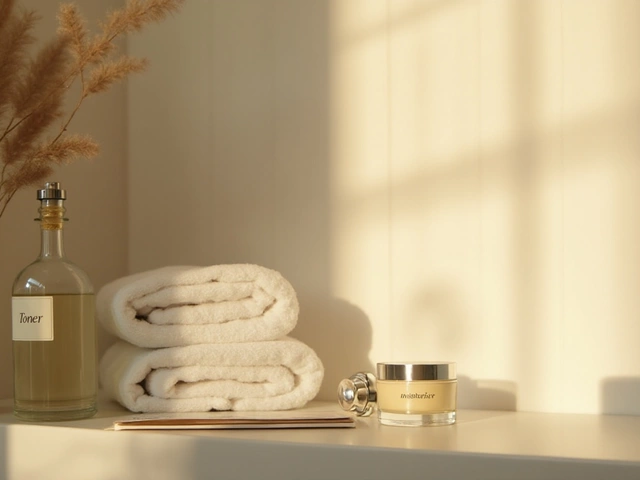Mental wellbeing is a cornerstone of a fulfilling life, yet it can often be overlooked in the hustle and bustle of daily routine. Many strive for clear minds, yearning to free themselves from the shackles of anxiety and stress. Fortunately, healing the mind is within reach, through intentional practices and lifestyle adjustments.
In this guide, we'll explore techniques that promote mental calmness and clarity. Whether through personal reflection or engaging with nature, each method offers unique benefits. The journey to a healthy mind is personal, one step at a time, making room for positivity and peace.
- Understanding Mental Clutter
- The Power of Mindfulness
- Nurturing Your Mind with Nature
- Healthy Habits for a Balanced Mind
- The Role of Sleep in Mind Healing
- Creative Outlets and Mental Peace
Understanding Mental Clutter
In today's fast-paced world, mental clutter is as common as the daily hustle. Our minds constantly juggle thoughts, tasks, and worries, often leaving us feeling overwhelmed and stressed. Mental clutter can be likened to a messy room, where disorganization disrupts the peace one seeks. This analogy helps understand why mental clutter affects our mental wellbeing. The mind, when cluttered, struggles with focus and clarity, making it challenging to prioritize tasks or make sound decisions.
Mental clutter doesn't simply arise from having too much to do; it stems from emotional anxieties, unfinished tasks, and even the digital noise that invades our space. It's important to recognize the sources of this clutter to begin decluttering. Identifying these elements is essential in addressing the root cause of stress and anxiety. A groundbreaking study by the American Psychological Association reveals that constant exposure to digital media increases stress levels, which contributes to mental clutter. Actions like turning off notifications or designating tech-free times can help reduce the clutter significantly.
Signs of Mental Clutter
Identifying mental clutter involves looking for specific signs. These include difficulty concentrating on tasks, feeling overwhelmed by decisions, and experiencing frequent forgetfulness. If you find yourself unable to complete tasks without getting distracted, mental clutter might be the culprit. Many individuals also report feeling 'brain fog', a condition where mental clarity seems elusive. Simple day-to-day tasks become challenging, and procrastination becomes a frequent companion. It’s like trying to find a specific item in a messy room; your mind becomes disoriented amidst the chaos.
"The greatest weapon against stress is our ability to choose one thought over another." — William James
Delving into the nature of these thoughts helps in understanding how to filter them effectively. When mental clutter is identified, strategies for organizing thoughts become feasible. Establishing a mental decluttering routine can enhance focus, leading to a more organized mind and consequently, improved mental health.
If Left Unaddressed
If not tackled in time, mental clutter can lead to more profound impacts on mental health. It can manifest as chronic stress and might worsen conditions like anxiety and depression. What begins as a harmless slew of jumbled thoughts can spiral into a significant impediment to everyday functioning. The constant hum of anxiety and scattered thoughts can turn into a persistent background noise that hinders daily achievements. It's not just about managing stress; it's about reclaiming the energy and focus needed to thrive.
Thus, tackling mental clutter is essential. By understanding its roots and manifestations, individuals can begin to take proactive steps towards decluttering their minds, paving the way for greater mental peace and heightened productivity. Embracing techniques like mindfulness and creating structured plans can lead to a significant transformation in one’s mental space.
The Power of Mindfulness
In the fast-paced world we live in, stress and anxiety often feel like unwelcome, constant companions, making it crucial to explore effective methods to calm the mind. Mindfulness offers exactly that—a sanctuary of tranquility in the midst of chaos. It is the practice of being fully present in each moment, aware of our sensations, thoughts, and feelings without judgment. By focusing on the present, we can let go of the clamor of anxiety that often stems from brooding over the past or fretting about the future. This approach fosters a deep sense of peace and balance, crucial components of sustainable mental wellbeing.
Mindfulness draws on ancient traditions, with meditation as a core practice, yet it seamlessly integrates into contemporary life. According to a 2020 study published in American Psychologist, consistent mindfulness practice not only reduces symptoms of anxiety and depression but also enhances overall mental health. It's fascinating how something as simple as focusing on one's breath or observing the present moment without attachment can bring about such profound benefits. Think about the impact of just a few minutes of daily mental respite on your mind's healing journey. Diving into the art of mindfulness changes how we relate to the world, leading to more compassionate and thoughtful interactions.
Consider a mindfulness meditation session that requires little more than a quiet space and a few minutes of your time. Begin by sitting comfortably, closing your eyes if you feel comfortable, and tuning into your breath. Notice the sensation as the air enters and leaves your nostrils. Whenever your mind wanders, gently bring it back to the breath. This simple act of focus is a cornerstone of mind healing practices. As you cultivate mindfulness habits, you'll likely notice a shift—not just in stress levels, but in how you engage with every aspect of your life. You might find serenity in tasks that once seemed mundane, from sipping morning coffee to taking evening strolls, savoring each moment for what it is rather than rushing through it.
"Mindfulness is a way of befriending ourselves and our experience." — Jon Kabat-Zinn
While mindfulness is deeply personal, it globally impacts mental wellbeing. Statistics show a significant increase in mindfulness practice adoption worldwide, evidenced by the surge of mindfulness-based courses and apps available today. This reveals a collective yearning to explore these ancient remedies in a modern context, indicating a societal shift toward embracing holistic healing solutions. With numerous studies underscoring its efficacy, mindfulness uniquely positions itself as a timeless tool for mental renewal, ready to aid anyone willing to try it.
Nurturing Your Mind with Nature
In today's fast-paced world, the healing power of nature is an antidote to the stress of modern life. Interaction with nature not only brings enjoyment but also nourishes the mind and soul. Many studies have shown that spending time in natural environments can greatly improve mental wellbeing. Being in nature reduces anger, fear, and stress, while increasing pleasant feelings. It helps by making you focus less on negative thoughts that may intrude daily life. With technology consuming so much of our time, disconnecting and immersing ourselves in a forest or garden can remind us of life's simplicity and beauty. Walking through greenery or having a picnic under the open sky isn't just refreshing; these environments provide a sanctuary for the mind to heal.
Consider incorporating regular nature walks into your lifestyle. These walks are more beneficial than just exercise. They provide a multisensory experience that no audio meditation or streaming app can replicate. The scent of pine trees, the crash of waves, or the sight of flowers swaying in a gentle breeze infuse a unique sense of joy and tranquility. According to a study published in the 'Journal of Environmental Psychology,' even short, 20-minute nature walks can significantly lower levels of cortisol, a stress-inducing hormone, leading to a calmer mind. In essence, it's a free form of therapy, with cumulative effects that could lead to long-term happiness.
The cultural lean on incorporating nature into mental health practices is not new. Japanese culture, for example, embraces shinrin-yoku, or 'forest bathing.' This isn't just a trendy wellness ritual but a healthcare practice. People immerse themselves in a forest atmosphere, taking in the surroundings through their senses, which is believed to improve mood and reduce stress. It's a ritual that has been practiced for centuries, underscoring the timeless relationship between humans and nature.
Yoshifumi Miyazaki, a leader in the study of forest therapy, notes, 'Spending time in the forest aligns with the natural frequencies of our bodies, offering benefits that modern life cannot.'
For those who don’t have immediate access to sprawling landscapes, bringing nature indoors is a fantastic alternative. Houseplants or even simple flower arrangements can brighten spaces and give a natural aesthetic to your environment. They do more than beautify your home; they also purify air, create pleasant aromas, and boost your mood. According to NASA's research on air-quality, some houseplants like peace lilies and snake plants help filter and purify indoor air naturally, which indirectly reduces stress levels. By incorporating even small elements of nature into your daily routine, you take an active role in creating a harmonious, stress-reducing environment.
In corporate settings, companies are recognizing the value of integrating natural elements into office designs. Biophilic design, which incorporates natural lighting, natural materials, and plants, has been linked to reduced stress and increased productivity. Imagine working in an office surrounded by lush greenery, coupled with natural light flooding through large windows. The aesthetic does wonders for creativity and job satisfaction, providing a constant, gentle nudge from nature to maintain a healthy mind. For those at home, consider organizing your workspace to face a window or adding a planter to your desk. Little changes the mind notices can make all the difference.
Making time for nature may require some effort, but the rewards for mental wellbeing are profound. Whether it's a dedicated weekend getaway to retreat into the forests, or a small shift towards greener spaces in your everyday life, nature stands as a reliable ally in your quest for mental peace. Cultivating a bond with nature provides a non-judgmental space, a free zone for thoughts to wander and settle, unhindered by societal demands. A walk in the park or a day spent hiking might seem straightforward, but the depth of what these natural experiences offer to mental wellbeing is truly remarkable. Finding solace in nature helps in nurturing the mind to its fullest potential and paving the way for lasting mental peace.

Healthy Habits for a Balanced Mind
Building a balanced mind requires adopting healthy habits that cater not only to your mental wellbeing but to your physical health as well. The connection between mind and body is profound; nourishing one invariably nurtures the other. Start by considering your daily routine—how much of it is dedicated to self-care versus work or stress-inducing activities? Finding equilibrium often starts with mindful evaluation. Creating a balance involves simple changes, such as establishing regular sleep patterns and committing to a nutritious diet, both of which significantly impact mental clarity and stress levels. Getting quality sleep is essential because it is during rest that the brain processes emotions and memories, preparing you for the challenges of the day to come. Moreover, a diet rich in omega-3 fatty acids, antioxidants, and vitamins can enhance your mood and reduce anxiety. These nutrients have been shown to improve brain function and emotional well-being.
Engaging in regular physical activity is another cornerstone habit for a balanced mind. Exercise stimulates the production of endorphins, often referred to as 'feel-good' hormones, which can alleviate stress and symptoms of anxiety and depression. Aim for at least 150 minutes of moderate aerobic activity or 75 minutes of vigorous activity each week, as recommended by health experts. This might seem daunting, but breaking it down into manageable sessions can make it more feasible. Physical activity doesn’t have to be a chore—it could be a brisk walk in the park, a yoga session in your living room, or dancing to your favorite tunes. The goal is to find something you enjoy, making it a sustainable part of your lifestyle. A study published by the Harvard T.H. Chan School of Public Health found that running for just 15 minutes a day or walking for an hour reduces the risk of major depression by 26%. This underscores the powerful benefits of consistent exercise on mental health.
Incorporating mindfulness practices, such as meditation and deep breathing exercises, can also drive significant improvements in mental health. These activities help center your thoughts and foster a sense of calmness and presence. They are known to reduce stress levels, lower blood pressure, and improve sleep quality, all of which are vital for maintaining a stable mind. Developing a mindfulness habit doesn't necessitate large chunks of your day; even five to ten minutes daily can make a difference. Begin or end your day with a short meditation session or incorporate moments of mindfulness into your routine by consciously focusing on your breath or the sensations in your body. Such practices cultivate greater awareness and control over your reactions, helping to mitigate the impacts of stress.
Social connection is another important habit that supports a balanced mind. Humans are inherently social creatures, and isolation can take a toll on mental wellness. Prioritize spending time with loved ones, either in person or virtually, to maintain social interactions. Engaging in meaningful conversations and sharing experiences fosters a sense of belonging and support. Whether it's a coffee date with a friend, a family game night, or participating in a community group, these social activities contribute to emotional health. In fact, research has highlighted how meaningful social connections enhance feelings of happiness and reduce feelings of loneliness and anxiety.
The Role of Sleep in Mind Healing
Sleep plays a crucial role in healing the mind. It is often said that a good night’s sleep is the best medicine, and this holds true in the realm of mental wellbeing. During sleep, the brain works diligently to process emotions and memories, consolidating learning from the day. Without adequate sleep, you might notice a decline in cognitive function, attention span, and overall mood. Scientists have discovered that sleep deprivation has a profound effect on mental health, often exacerbating conditions such as anxiety and depression. A consistent lack of sleep can even lead to increased stress levels, as it disrupts the body's natural stress response.
One might wonder why sleep is so effective at mind healing. The answer lies in its ability to reset and restore. While you rest, the brain clears out toxic waste products that accumulate throughout the day. This biological cleaning process is essential for maintaining brain health in the long term. Moreover, sleep supports the brain’s ability to adapt, known as neuroplasticity, enabling it to reorganize itself and improve resilience to mental stress. According to a study published in the journal Science, individuals who had a proper sleep cycle showed a 60% increase in problem-solving skills compared to those who didn't.
"Sleep is that golden chain that ties health and our bodies together," once remarked the famous writer Thomas Dekker, emphasizing the invaluable role sleep plays in health.
Creating healthy sleep habits can significantly benefit one's life. The journey to achieving better sleep starts with establishing a consistent sleep schedule. Aim to go to bed and wake up at the same time, even on weekends, to regulate your body’s internal clock. Consider your sleep environment; block out noise and light, and ensure your bedroom is a haven for rest. Limit exposure to screens before bed, as blue light can hinder the production of melatonin, the hormone responsible for sleep. Engaging in a relaxing pre-sleep routine such as reading or listening to soothing music can signal the body it’s time to wind down. This step is especially crucial if you’re looking to optimize mind healing—a mind free of stress finds sleep much more inviting.
Sometimes, understanding the scope of sleep's impact on mental health requires concrete data. For instance, the National Sleep Foundation recommends that adults aim for 7-9 hours of sleep each night, which is associated with optimal health benefits. Recent research indicates that getting less than six hours of sleep per night can lead to cognitive impairment comparable to foreign substance influence. With adequate sleep, the mind can better handle the tasks and stresses that come with everyday life. Prioritizing sleep is therefore not just recommended, but essential for maintaining a healthy mental state.
Creative Outlets and Mental Peace
Every person carries an inherent potential for creativity, whether it manifests through painting, writing, music, or even gardening. Engaging in these creative outlets can act as a profound balm for the mind, offering solace amidst life's chaos. When we immerse ourselves in a creative process, our brain enters a unique state of focus and awareness. This shift allows us to disconnect from stressors and anxieties, thus fostering the healing of our minds. Interestingly, studies have shown that creating art reduces stress hormones and enhances overall wellbeing, making it a valuable practice for anyone seeking mental wellness.
Many people report an intriguing phenomenon when engaging in creative activities: time seems to fly by, and they often lose themselves in the process. Psychologists term this state as 'flow,' a mental state where a person performing an activity is fully immersed in a feeling of energized focus and enjoyment. Achieving flow is known to increase happiness levels and boost cognitive function. And the best part? One doesn't need to create a masterpiece to enjoy these benefits. The simple act of creativity is enough to trigger these positive changes in the brain, tapping into a reservoir of peace and contentment that often lies dormant.
As paint brushes dance upon the canvas or fingers glide over piano keys, individuals find a sense of freedom that is hard to replicate elsewhere. Artistic pursuits allow us to express emotions that words often fail to capture. Through colors, melodies, or verses, we uncover parts of ourselves that remain hidden in everyday conversation. This personal exploration is an essential step towards achieving mental wellbeing. Engaging in creative outlets also helps to shift negative thinking patterns into positive ones, as the mind is occupied with the creation rather than rumination.
Moreover, the social aspect of creativity should not be overlooked. Joining a community art class, participating in a writing circle, or attending a dance workshop can offer much-needed social connections. These interactions help to form bonds that provide support and understanding, greatly enhancing one’s mental health.
"Art washes away from the soul the dust of everyday life," said Pablo Picasso. This sentiment underscores the transformative power of creativity in lifting spirits and providing comfort. Scientific evidence backs this by showcasing how shared creativity boosts social skills and increases empathy, crucial components of personal happiness.
For those embarking on a journey of mental healing through creative means, it's essential to approach with an open heart and patience. Results may not be immediate, but patience and perseverance pave the way for eventual harmony. With a variety of creative outlets to choose from, each person can find their niche, their unique method of expression. Whether it’s through a new recipe in the kitchen or a sketchpad at a local park, the journey of discovery holds value on its own. Unlocking mental peace is not only about the end product but reveling in the unexpected pleasures encountered along the way.
Researchers have interestingly highlighted a connection between creativity and stress relief, suggesting that activities like knitting can contribute to increased serotonin production. The repetitive motion, coupled with the focus required, creates a meditative effect that further amplifies relaxation. Documenting insights through journals or capturing inspiration with photos are powerful ways of maintaining a connection to one's creative process. Attaining mental peace is ultimately a personalized experience; what matters most is the genuine engagement in an activity that resonates with an individual's spirit.





